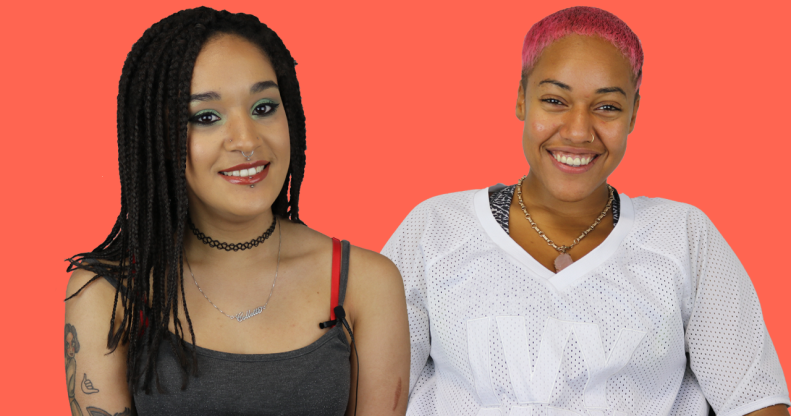
Queer Black activists on why Black Pride is so important (PinkNews)
Ahead of UK Black Pride, PinkNews spoke to several activists on what the event means to them as queer people of colour and how white LGBTQ+ people can be allies.
Intersex activist Anick is part of the team behind this year’s UK Black Pride event in London on Sunday, July 8.
Anick spoke to PinkNews following Stonewall’s survey that found 51 percent of Black, Asian and Minority Ethnic LGBT face discrimination within the queer community.
Anick, 23, said: “I’m actually surprised it’s not higher than that because it’s something which a lot of people of colour experience on a daily basis.
“When you walk into a room, you can often sense you’re the only person of colour there.
“People often say, ‘You’re not really my type’ – they frame it in words of preference and think it’s not racist but they should try being on the receiving on the end of that.
“So don’t just say I’m an ally today, do something that actually makes you an ally.”
Tanya Compas, who leads on youth engagement at Black Pride, shared her experiences being in queer spaces as a black woman and the “pressure to perform” her blackness.
“I feel like the mainstream Pride events are only catered to white, gay men.
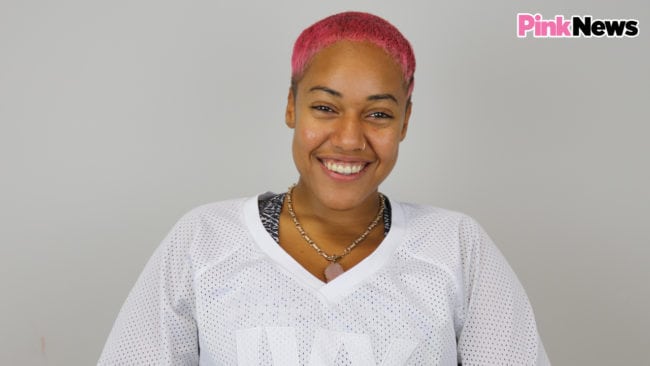
Tanya Compas (PinkNews)
“I don’t feel safe in those spaces because they’re looking at me like, ‘What are you doing here?’
“Within the queer community, people of colour face a lot of issues.
“White people look at you like you’re a performing monkey ready to do the dance moves so they can say ‘yaaas queen’ or use that kind of language.
“I’ve felt that quite a lot in certain spaces, where I feel like I have to perform my blackness in order to be accepted – and if I don’t, then I’m ‘angry.’
“And if you don’t reciprocate, they’re like, ‘I’m just trying to be your friend,’ but I don’t want to be your friend if you’re going to talk to me like that.
“I’m still a human being, I don’t say ‘yaas’ to everything.”
Tanya suggested that if you are a white LGBTQ person thinking of attending events like Black Pride, consider how you might fit into those spaces.
“Another great way to be an ally if you’re coming to black or POC-focused event, [is to] know it’s not a space for you to be the centre of attention.
“Understand that we’ve worked so hard to create spaces that make us feel safe, that if you now feel like you want to appropriate these spaces because they are cool, step back and think why you are going.
“If you’re going to a black event, and you have no black friends, what’s going on?”
Ryan Lanji, originally from Canada, runs a gay Bollywood and hip-hop night in London.
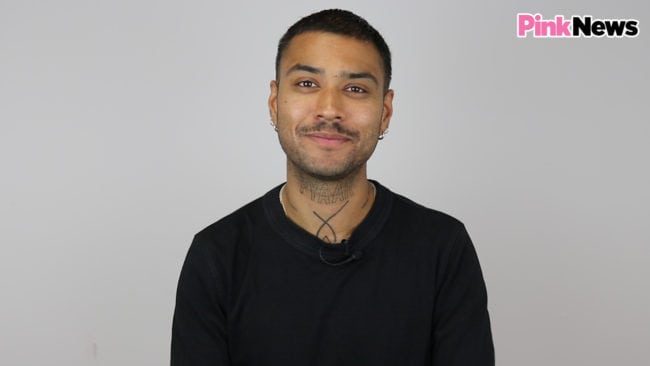
Ryan Lanji (PinkNews)
For him, Black Pride is “very special and unique.”
As a queer person of colour, he finds the LGBT community is not always welcoming.
“There have been times where I have felt excluded by my own LGBT community.
“And I tell you it’s really hard when you have to walk away from those situations and ask whether it was because of your colour.
“I think that’s one of the hardest challenges for us to overcome: finding spaces within our community where we feel comfortable.”
“It’s really important for them to welcome people in, and it’s also important for people of colour to invite people in.”
Angelina, 36, identifies as lesbian and lives in London. She said that Black Pride to her means “a stamp to say that we are here.”
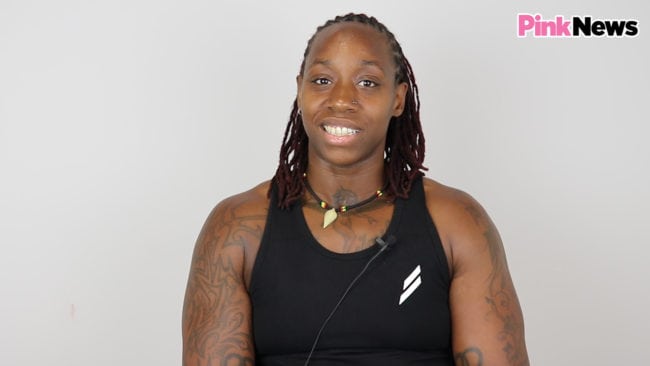
Angelina (PinkNews)
She told PinkNews how allies can step up: “You can identify where we’re coming from, but you can’t say you know where we’re coming from.
“What we need is white allies to listen and then give us a position to be the spokesperson for our community – not be it for us.
“Don’t try to be the hero because you’re not a saviour, we just need you to treat us like yourselves and give us the opportunity to speak.”
Kenneth Norwood, from New Orleans, told PinkNews about his experience of attending Pride events in New York and not being let into gay clubs because of his appearance.
“Black Pride, to me, means resistance and preservation,” he said.
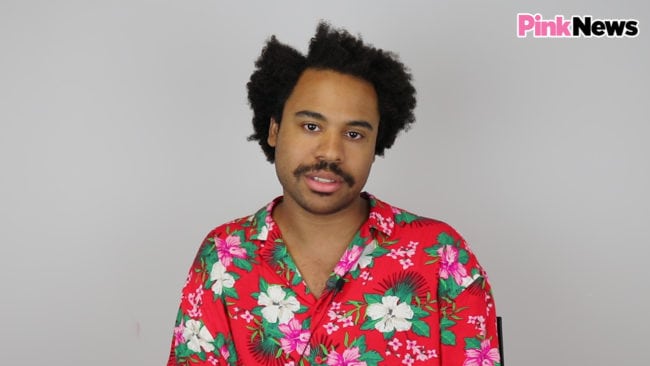
Kenneth Norwood (PinkNews)
“Resistance in a time where Pride has kind of been co-opted by corporate entities and it’s kind of lost it’s touch to what it used to be.”
“Preservation in terms of keeping that historical narrative alive, that it wasn’t just a cisgender, white, male movement but actually it was a very, very inclusive black and Latina trans movement.”
Kenneth added that Pride should never lose its historical connection to the Stonewall riots, and activists such as Marsha P. Johnson and Sylvia Rivera.
“Black spaces are disappearing, particularly in places where I used to live in New Orleans, they’ve either burned down or been shut down.
“So they really have nowhere else to go because going to the white clubs have a very, very abrasive feel to them.
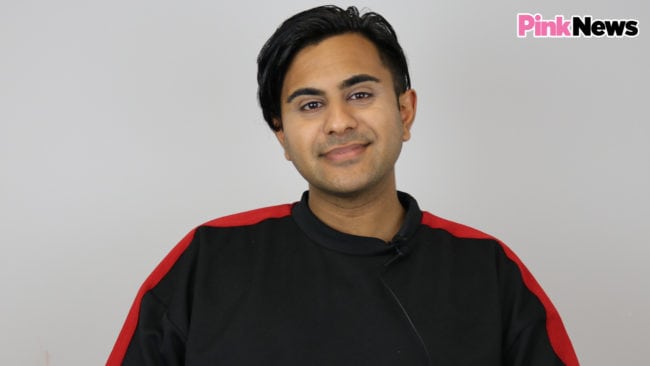
Anick (PinkNews)
“So having a space means refuge, refuge to express yourself and not warrant any tension or anger.
“From relationships to everyday living, there’s a reluctance to accept you by a sea of people who just don’t look like you.”
He added that allies should “acknowledge where you stand in a system of oppression” and recognise how they may be benefiting from that system.
“Understand that even if you’re a white, queer male, you still benefit from patriarchy.
“Like I’m a black queer male, I also acknowledge that I benefit from male privilege.
“So it’s about acknowledging those systems of oppression and how you dismantle them.”
Collette Commodore added: “We wouldn’t have Pride if it wasn’t for a black, trans woman so I’m very proud to be black and queer.
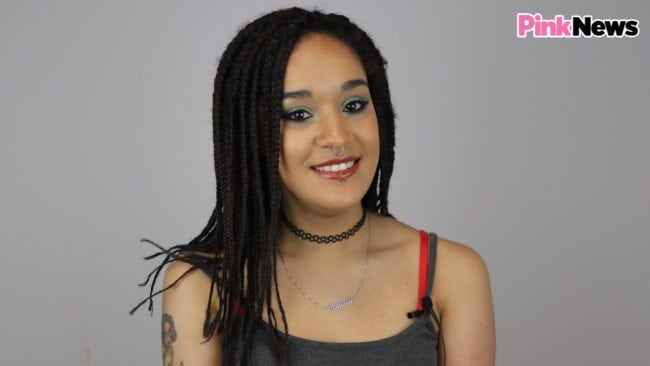
Collette Commodore (PinkNews)
“It’s important to celebrate who we are with people you identify with – go to a safe space and just be yourself.
“The best way you could be an ally is definitely to listen to queer people of colour when they tell you something.
“You should always listen before you make a judgement and look things up for yourself to see what you could do to help.”
UK Black Pride is Britain’s community-led organisation for African, Asian, Arab and Caribbean heritage LGBT people, their families and supporters’ and this year is themed on Shades of the Diaspora.
UK Black Pride 2018 is on Sunday, July 8 in Vauxhall Pleasure Gardens, London.
